Leadership and Management in the Service Industry
VerifiedAdded on 2023/01/11
|12
|3977
|1
AI Summary
This document discusses the application of classical management theory in the service industry, the role of leaders and various leadership styles, and the management and leadership style within the service sector. It also explores the internal and external factors influencing the management style and provides insights into the skills required for future management and leadership in the hospitality industry.
Contribute Materials
Your contribution can guide someone’s learning journey. Share your
documents today.
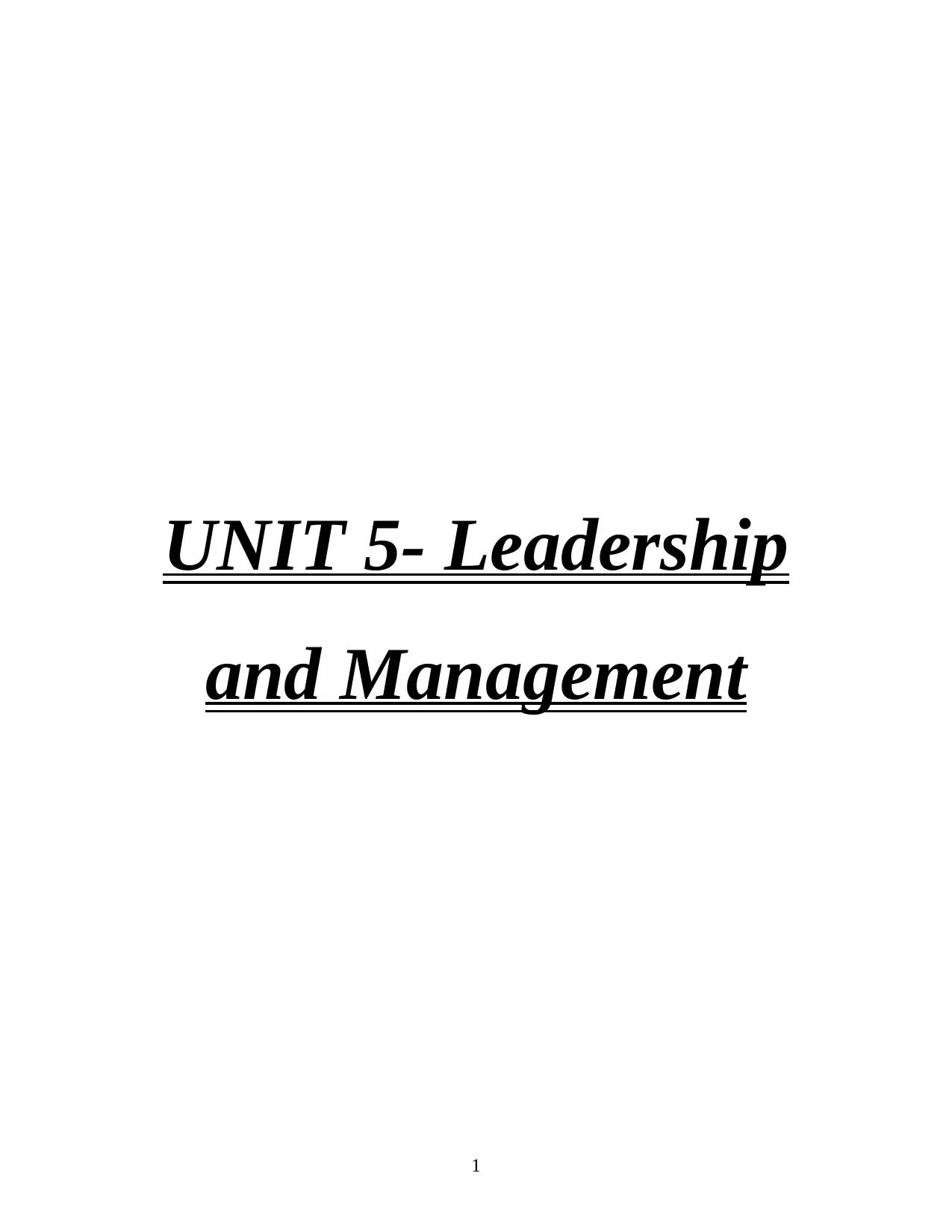
UNIT 5- Leadership
and Management
1
and Management
1
Secure Best Marks with AI Grader
Need help grading? Try our AI Grader for instant feedback on your assignments.
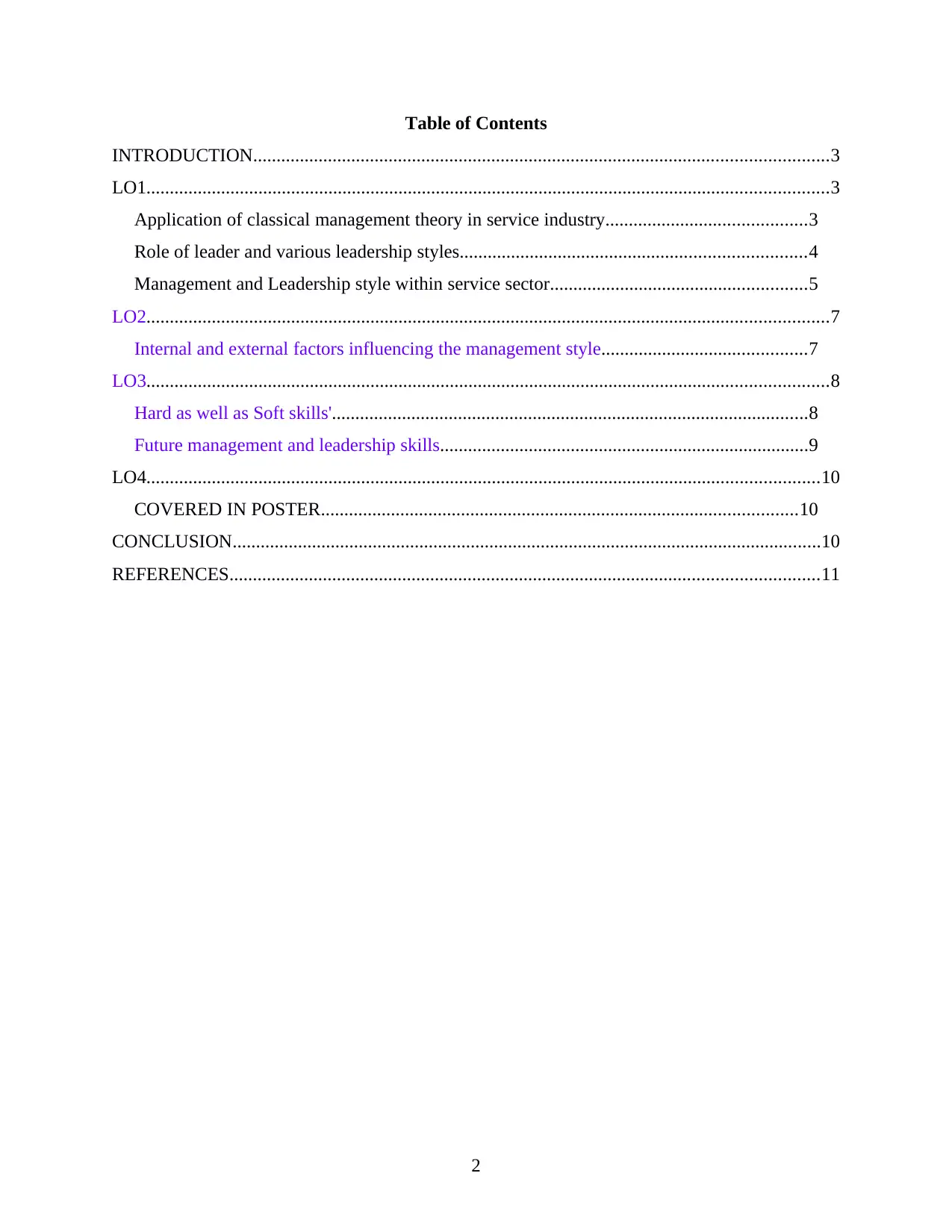
Table of Contents
INTRODUCTION...........................................................................................................................3
LO1..................................................................................................................................................3
Application of classical management theory in service industry...........................................3
Role of leader and various leadership styles..........................................................................4
Management and Leadership style within service sector.......................................................5
LO2..................................................................................................................................................7
Internal and external factors influencing the management style............................................7
LO3..................................................................................................................................................8
Hard as well as Soft skills'......................................................................................................8
Future management and leadership skills...............................................................................9
LO4................................................................................................................................................10
COVERED IN POSTER......................................................................................................10
CONCLUSION..............................................................................................................................10
REFERENCES..............................................................................................................................11
2
INTRODUCTION...........................................................................................................................3
LO1..................................................................................................................................................3
Application of classical management theory in service industry...........................................3
Role of leader and various leadership styles..........................................................................4
Management and Leadership style within service sector.......................................................5
LO2..................................................................................................................................................7
Internal and external factors influencing the management style............................................7
LO3..................................................................................................................................................8
Hard as well as Soft skills'......................................................................................................8
Future management and leadership skills...............................................................................9
LO4................................................................................................................................................10
COVERED IN POSTER......................................................................................................10
CONCLUSION..............................................................................................................................10
REFERENCES..............................................................................................................................11
2
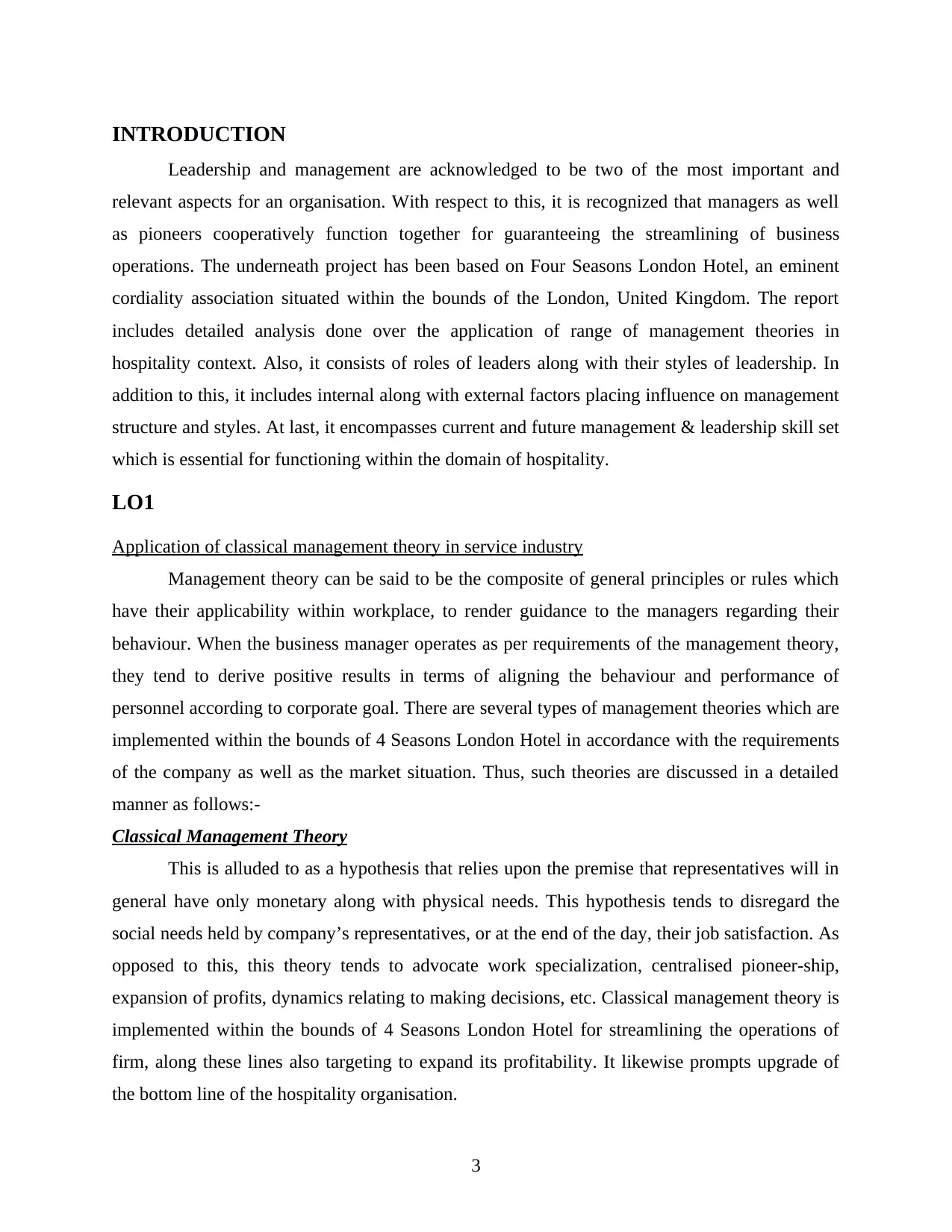
INTRODUCTION
Leadership and management are acknowledged to be two of the most important and
relevant aspects for an organisation. With respect to this, it is recognized that managers as well
as pioneers cooperatively function together for guaranteeing the streamlining of business
operations. The underneath project has been based on Four Seasons London Hotel, an eminent
cordiality association situated within the bounds of the London, United Kingdom. The report
includes detailed analysis done over the application of range of management theories in
hospitality context. Also, it consists of roles of leaders along with their styles of leadership. In
addition to this, it includes internal along with external factors placing influence on management
structure and styles. At last, it encompasses current and future management & leadership skill set
which is essential for functioning within the domain of hospitality.
LO1
Application of classical management theory in service industry
Management theory can be said to be the composite of general principles or rules which
have their applicability within workplace, to render guidance to the managers regarding their
behaviour. When the business manager operates as per requirements of the management theory,
they tend to derive positive results in terms of aligning the behaviour and performance of
personnel according to corporate goal. There are several types of management theories which are
implemented within the bounds of 4 Seasons London Hotel in accordance with the requirements
of the company as well as the market situation. Thus, such theories are discussed in a detailed
manner as follows:-
Classical Management Theory
This is alluded to as a hypothesis that relies upon the premise that representatives will in
general have only monetary along with physical needs. This hypothesis tends to disregard the
social needs held by company’s representatives, or at the end of the day, their job satisfaction. As
opposed to this, this theory tends to advocate work specialization, centralised pioneer-ship,
expansion of profits, dynamics relating to making decisions, etc. Classical management theory is
implemented within the bounds of 4 Seasons London Hotel for streamlining the operations of
firm, along these lines also targeting to expand its profitability. It likewise prompts upgrade of
the bottom line of the hospitality organisation.
3
Leadership and management are acknowledged to be two of the most important and
relevant aspects for an organisation. With respect to this, it is recognized that managers as well
as pioneers cooperatively function together for guaranteeing the streamlining of business
operations. The underneath project has been based on Four Seasons London Hotel, an eminent
cordiality association situated within the bounds of the London, United Kingdom. The report
includes detailed analysis done over the application of range of management theories in
hospitality context. Also, it consists of roles of leaders along with their styles of leadership. In
addition to this, it includes internal along with external factors placing influence on management
structure and styles. At last, it encompasses current and future management & leadership skill set
which is essential for functioning within the domain of hospitality.
LO1
Application of classical management theory in service industry
Management theory can be said to be the composite of general principles or rules which
have their applicability within workplace, to render guidance to the managers regarding their
behaviour. When the business manager operates as per requirements of the management theory,
they tend to derive positive results in terms of aligning the behaviour and performance of
personnel according to corporate goal. There are several types of management theories which are
implemented within the bounds of 4 Seasons London Hotel in accordance with the requirements
of the company as well as the market situation. Thus, such theories are discussed in a detailed
manner as follows:-
Classical Management Theory
This is alluded to as a hypothesis that relies upon the premise that representatives will in
general have only monetary along with physical needs. This hypothesis tends to disregard the
social needs held by company’s representatives, or at the end of the day, their job satisfaction. As
opposed to this, this theory tends to advocate work specialization, centralised pioneer-ship,
expansion of profits, dynamics relating to making decisions, etc. Classical management theory is
implemented within the bounds of 4 Seasons London Hotel for streamlining the operations of
firm, along these lines also targeting to expand its profitability. It likewise prompts upgrade of
the bottom line of the hospitality organisation.
3
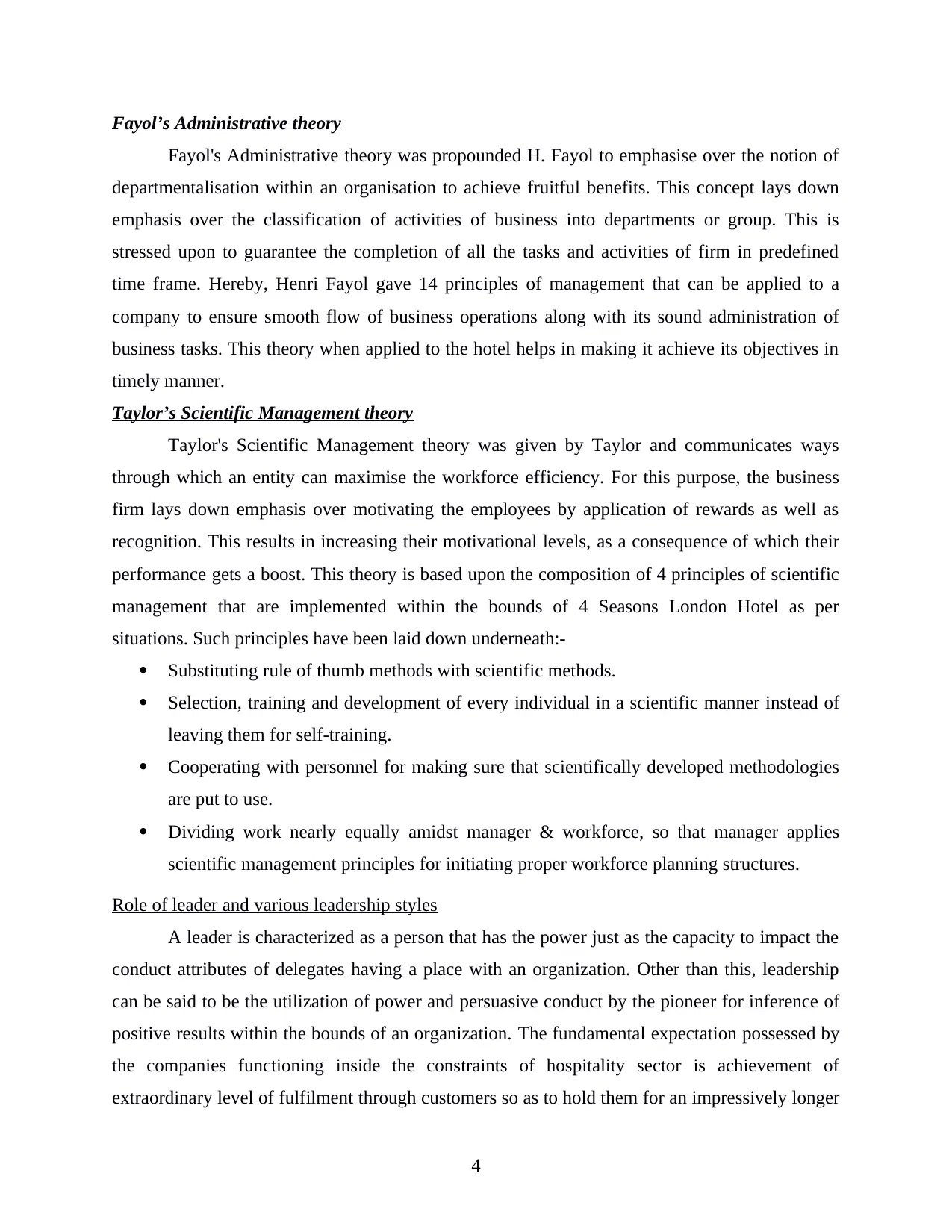
Fayol’s Administrative theory
Fayol's Administrative theory was propounded H. Fayol to emphasise over the notion of
departmentalisation within an organisation to achieve fruitful benefits. This concept lays down
emphasis over the classification of activities of business into departments or group. This is
stressed upon to guarantee the completion of all the tasks and activities of firm in predefined
time frame. Hereby, Henri Fayol gave 14 principles of management that can be applied to a
company to ensure smooth flow of business operations along with its sound administration of
business tasks. This theory when applied to the hotel helps in making it achieve its objectives in
timely manner.
Taylor’s Scientific Management theory
Taylor's Scientific Management theory was given by Taylor and communicates ways
through which an entity can maximise the workforce efficiency. For this purpose, the business
firm lays down emphasis over motivating the employees by application of rewards as well as
recognition. This results in increasing their motivational levels, as a consequence of which their
performance gets a boost. This theory is based upon the composition of 4 principles of scientific
management that are implemented within the bounds of 4 Seasons London Hotel as per
situations. Such principles have been laid down underneath:-
Substituting rule of thumb methods with scientific methods.
Selection, training and development of every individual in a scientific manner instead of
leaving them for self-training.
Cooperating with personnel for making sure that scientifically developed methodologies
are put to use.
Dividing work nearly equally amidst manager & workforce, so that manager applies
scientific management principles for initiating proper workforce planning structures.
Role of leader and various leadership styles
A leader is characterized as a person that has the power just as the capacity to impact the
conduct attributes of delegates having a place with an organization. Other than this, leadership
can be said to be the utilization of power and persuasive conduct by the pioneer for inference of
positive results within the bounds of an organization. The fundamental expectation possessed by
the companies functioning inside the constraints of hospitality sector is achievement of
extraordinary level of fulfilment through customers so as to hold them for an impressively longer
4
Fayol's Administrative theory was propounded H. Fayol to emphasise over the notion of
departmentalisation within an organisation to achieve fruitful benefits. This concept lays down
emphasis over the classification of activities of business into departments or group. This is
stressed upon to guarantee the completion of all the tasks and activities of firm in predefined
time frame. Hereby, Henri Fayol gave 14 principles of management that can be applied to a
company to ensure smooth flow of business operations along with its sound administration of
business tasks. This theory when applied to the hotel helps in making it achieve its objectives in
timely manner.
Taylor’s Scientific Management theory
Taylor's Scientific Management theory was given by Taylor and communicates ways
through which an entity can maximise the workforce efficiency. For this purpose, the business
firm lays down emphasis over motivating the employees by application of rewards as well as
recognition. This results in increasing their motivational levels, as a consequence of which their
performance gets a boost. This theory is based upon the composition of 4 principles of scientific
management that are implemented within the bounds of 4 Seasons London Hotel as per
situations. Such principles have been laid down underneath:-
Substituting rule of thumb methods with scientific methods.
Selection, training and development of every individual in a scientific manner instead of
leaving them for self-training.
Cooperating with personnel for making sure that scientifically developed methodologies
are put to use.
Dividing work nearly equally amidst manager & workforce, so that manager applies
scientific management principles for initiating proper workforce planning structures.
Role of leader and various leadership styles
A leader is characterized as a person that has the power just as the capacity to impact the
conduct attributes of delegates having a place with an organization. Other than this, leadership
can be said to be the utilization of power and persuasive conduct by the pioneer for inference of
positive results within the bounds of an organization. The fundamental expectation possessed by
the companies functioning inside the constraints of hospitality sector is achievement of
extraordinary level of fulfilment through customers so as to hold them for an impressively longer
4
Secure Best Marks with AI Grader
Need help grading? Try our AI Grader for instant feedback on your assignments.
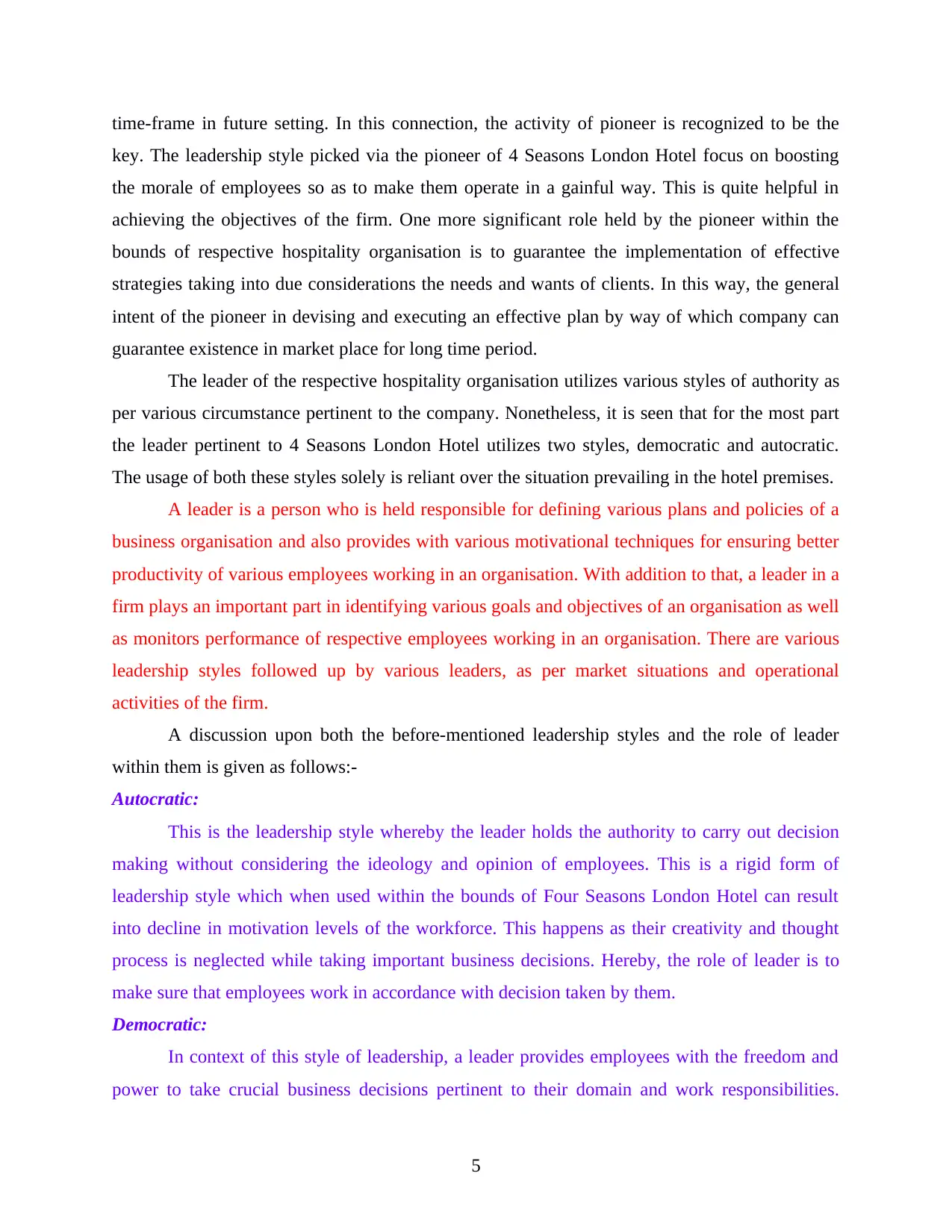
time-frame in future setting. In this connection, the activity of pioneer is recognized to be the
key. The leadership style picked via the pioneer of 4 Seasons London Hotel focus on boosting
the morale of employees so as to make them operate in a gainful way. This is quite helpful in
achieving the objectives of the firm. One more significant role held by the pioneer within the
bounds of respective hospitality organisation is to guarantee the implementation of effective
strategies taking into due considerations the needs and wants of clients. In this way, the general
intent of the pioneer in devising and executing an effective plan by way of which company can
guarantee existence in market place for long time period.
The leader of the respective hospitality organisation utilizes various styles of authority as
per various circumstance pertinent to the company. Nonetheless, it is seen that for the most part
the leader pertinent to 4 Seasons London Hotel utilizes two styles, democratic and autocratic.
The usage of both these styles solely is reliant over the situation prevailing in the hotel premises.
A leader is a person who is held responsible for defining various plans and policies of a
business organisation and also provides with various motivational techniques for ensuring better
productivity of various employees working in an organisation. With addition to that, a leader in a
firm plays an important part in identifying various goals and objectives of an organisation as well
as monitors performance of respective employees working in an organisation. There are various
leadership styles followed up by various leaders, as per market situations and operational
activities of the firm.
A discussion upon both the before-mentioned leadership styles and the role of leader
within them is given as follows:-
Autocratic:
This is the leadership style whereby the leader holds the authority to carry out decision
making without considering the ideology and opinion of employees. This is a rigid form of
leadership style which when used within the bounds of Four Seasons London Hotel can result
into decline in motivation levels of the workforce. This happens as their creativity and thought
process is neglected while taking important business decisions. Hereby, the role of leader is to
make sure that employees work in accordance with decision taken by them.
Democratic:
In context of this style of leadership, a leader provides employees with the freedom and
power to take crucial business decisions pertinent to their domain and work responsibilities.
5
key. The leadership style picked via the pioneer of 4 Seasons London Hotel focus on boosting
the morale of employees so as to make them operate in a gainful way. This is quite helpful in
achieving the objectives of the firm. One more significant role held by the pioneer within the
bounds of respective hospitality organisation is to guarantee the implementation of effective
strategies taking into due considerations the needs and wants of clients. In this way, the general
intent of the pioneer in devising and executing an effective plan by way of which company can
guarantee existence in market place for long time period.
The leader of the respective hospitality organisation utilizes various styles of authority as
per various circumstance pertinent to the company. Nonetheless, it is seen that for the most part
the leader pertinent to 4 Seasons London Hotel utilizes two styles, democratic and autocratic.
The usage of both these styles solely is reliant over the situation prevailing in the hotel premises.
A leader is a person who is held responsible for defining various plans and policies of a
business organisation and also provides with various motivational techniques for ensuring better
productivity of various employees working in an organisation. With addition to that, a leader in a
firm plays an important part in identifying various goals and objectives of an organisation as well
as monitors performance of respective employees working in an organisation. There are various
leadership styles followed up by various leaders, as per market situations and operational
activities of the firm.
A discussion upon both the before-mentioned leadership styles and the role of leader
within them is given as follows:-
Autocratic:
This is the leadership style whereby the leader holds the authority to carry out decision
making without considering the ideology and opinion of employees. This is a rigid form of
leadership style which when used within the bounds of Four Seasons London Hotel can result
into decline in motivation levels of the workforce. This happens as their creativity and thought
process is neglected while taking important business decisions. Hereby, the role of leader is to
make sure that employees work in accordance with decision taken by them.
Democratic:
In context of this style of leadership, a leader provides employees with the freedom and
power to take crucial business decisions pertinent to their domain and work responsibilities.
5
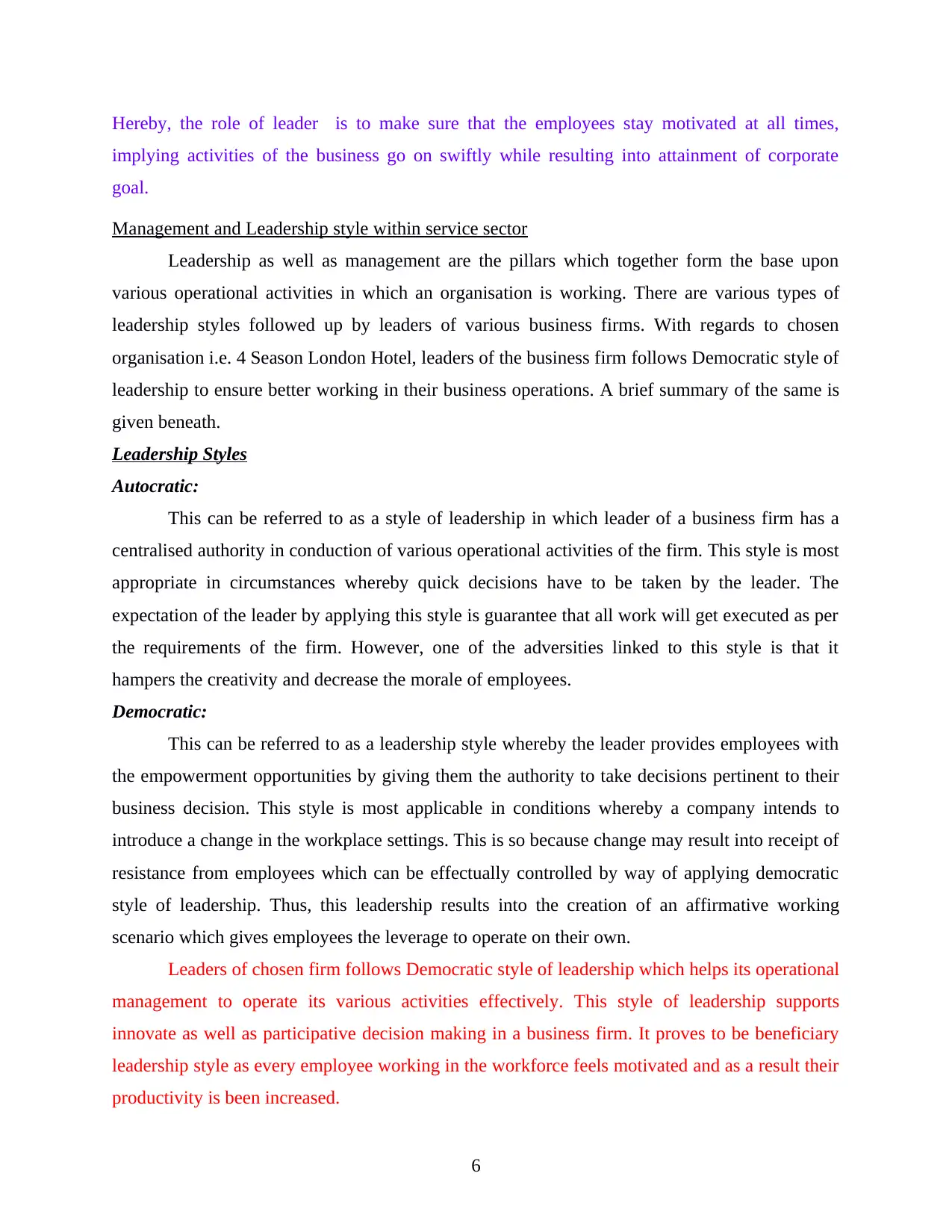
Hereby, the role of leader is to make sure that the employees stay motivated at all times,
implying activities of the business go on swiftly while resulting into attainment of corporate
goal.
Management and Leadership style within service sector
Leadership as well as management are the pillars which together form the base upon
various operational activities in which an organisation is working. There are various types of
leadership styles followed up by leaders of various business firms. With regards to chosen
organisation i.e. 4 Season London Hotel, leaders of the business firm follows Democratic style of
leadership to ensure better working in their business operations. A brief summary of the same is
given beneath.
Leadership Styles
Autocratic:
This can be referred to as a style of leadership in which leader of a business firm has a
centralised authority in conduction of various operational activities of the firm. This style is most
appropriate in circumstances whereby quick decisions have to be taken by the leader. The
expectation of the leader by applying this style is guarantee that all work will get executed as per
the requirements of the firm. However, one of the adversities linked to this style is that it
hampers the creativity and decrease the morale of employees.
Democratic:
This can be referred to as a leadership style whereby the leader provides employees with
the empowerment opportunities by giving them the authority to take decisions pertinent to their
business decision. This style is most applicable in conditions whereby a company intends to
introduce a change in the workplace settings. This is so because change may result into receipt of
resistance from employees which can be effectually controlled by way of applying democratic
style of leadership. Thus, this leadership results into the creation of an affirmative working
scenario which gives employees the leverage to operate on their own.
Leaders of chosen firm follows Democratic style of leadership which helps its operational
management to operate its various activities effectively. This style of leadership supports
innovate as well as participative decision making in a business firm. It proves to be beneficiary
leadership style as every employee working in the workforce feels motivated and as a result their
productivity is been increased.
6
implying activities of the business go on swiftly while resulting into attainment of corporate
goal.
Management and Leadership style within service sector
Leadership as well as management are the pillars which together form the base upon
various operational activities in which an organisation is working. There are various types of
leadership styles followed up by leaders of various business firms. With regards to chosen
organisation i.e. 4 Season London Hotel, leaders of the business firm follows Democratic style of
leadership to ensure better working in their business operations. A brief summary of the same is
given beneath.
Leadership Styles
Autocratic:
This can be referred to as a style of leadership in which leader of a business firm has a
centralised authority in conduction of various operational activities of the firm. This style is most
appropriate in circumstances whereby quick decisions have to be taken by the leader. The
expectation of the leader by applying this style is guarantee that all work will get executed as per
the requirements of the firm. However, one of the adversities linked to this style is that it
hampers the creativity and decrease the morale of employees.
Democratic:
This can be referred to as a leadership style whereby the leader provides employees with
the empowerment opportunities by giving them the authority to take decisions pertinent to their
business decision. This style is most applicable in conditions whereby a company intends to
introduce a change in the workplace settings. This is so because change may result into receipt of
resistance from employees which can be effectually controlled by way of applying democratic
style of leadership. Thus, this leadership results into the creation of an affirmative working
scenario which gives employees the leverage to operate on their own.
Leaders of chosen firm follows Democratic style of leadership which helps its operational
management to operate its various activities effectively. This style of leadership supports
innovate as well as participative decision making in a business firm. It proves to be beneficiary
leadership style as every employee working in the workforce feels motivated and as a result their
productivity is been increased.
6
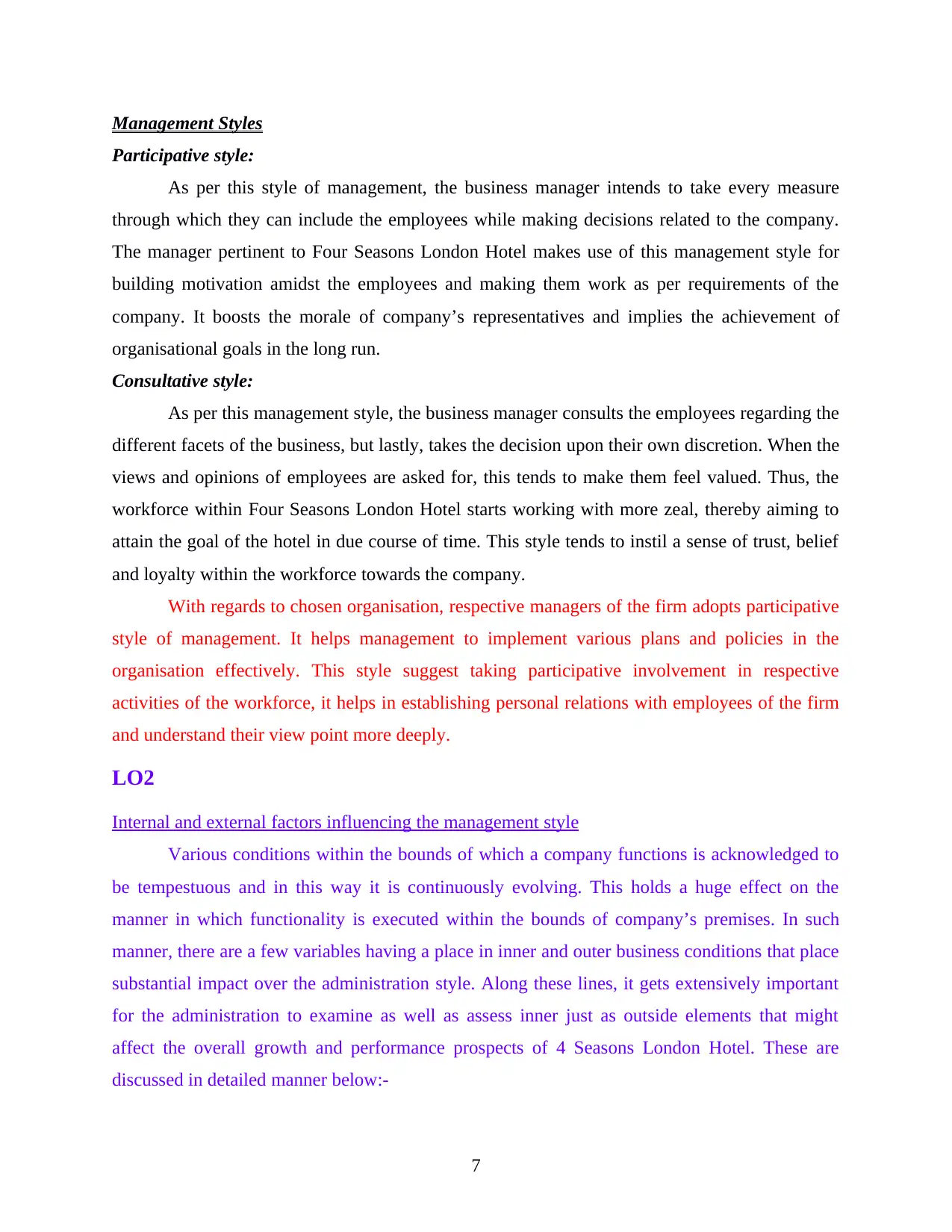
Management Styles
Participative style:
As per this style of management, the business manager intends to take every measure
through which they can include the employees while making decisions related to the company.
The manager pertinent to Four Seasons London Hotel makes use of this management style for
building motivation amidst the employees and making them work as per requirements of the
company. It boosts the morale of company’s representatives and implies the achievement of
organisational goals in the long run.
Consultative style:
As per this management style, the business manager consults the employees regarding the
different facets of the business, but lastly, takes the decision upon their own discretion. When the
views and opinions of employees are asked for, this tends to make them feel valued. Thus, the
workforce within Four Seasons London Hotel starts working with more zeal, thereby aiming to
attain the goal of the hotel in due course of time. This style tends to instil a sense of trust, belief
and loyalty within the workforce towards the company.
With regards to chosen organisation, respective managers of the firm adopts participative
style of management. It helps management to implement various plans and policies in the
organisation effectively. This style suggest taking participative involvement in respective
activities of the workforce, it helps in establishing personal relations with employees of the firm
and understand their view point more deeply.
LO2
Internal and external factors influencing the management style
Various conditions within the bounds of which a company functions is acknowledged to
be tempestuous and in this way it is continuously evolving. This holds a huge effect on the
manner in which functionality is executed within the bounds of company’s premises. In such
manner, there are a few variables having a place in inner and outer business conditions that place
substantial impact over the administration style. Along these lines, it gets extensively important
for the administration to examine as well as assess inner just as outside elements that might
affect the overall growth and performance prospects of 4 Seasons London Hotel. These are
discussed in detailed manner below:-
7
Participative style:
As per this style of management, the business manager intends to take every measure
through which they can include the employees while making decisions related to the company.
The manager pertinent to Four Seasons London Hotel makes use of this management style for
building motivation amidst the employees and making them work as per requirements of the
company. It boosts the morale of company’s representatives and implies the achievement of
organisational goals in the long run.
Consultative style:
As per this management style, the business manager consults the employees regarding the
different facets of the business, but lastly, takes the decision upon their own discretion. When the
views and opinions of employees are asked for, this tends to make them feel valued. Thus, the
workforce within Four Seasons London Hotel starts working with more zeal, thereby aiming to
attain the goal of the hotel in due course of time. This style tends to instil a sense of trust, belief
and loyalty within the workforce towards the company.
With regards to chosen organisation, respective managers of the firm adopts participative
style of management. It helps management to implement various plans and policies in the
organisation effectively. This style suggest taking participative involvement in respective
activities of the workforce, it helps in establishing personal relations with employees of the firm
and understand their view point more deeply.
LO2
Internal and external factors influencing the management style
Various conditions within the bounds of which a company functions is acknowledged to
be tempestuous and in this way it is continuously evolving. This holds a huge effect on the
manner in which functionality is executed within the bounds of company’s premises. In such
manner, there are a few variables having a place in inner and outer business conditions that place
substantial impact over the administration style. Along these lines, it gets extensively important
for the administration to examine as well as assess inner just as outside elements that might
affect the overall growth and performance prospects of 4 Seasons London Hotel. These are
discussed in detailed manner below:-
7
Paraphrase This Document
Need a fresh take? Get an instant paraphrase of this document with our AI Paraphraser
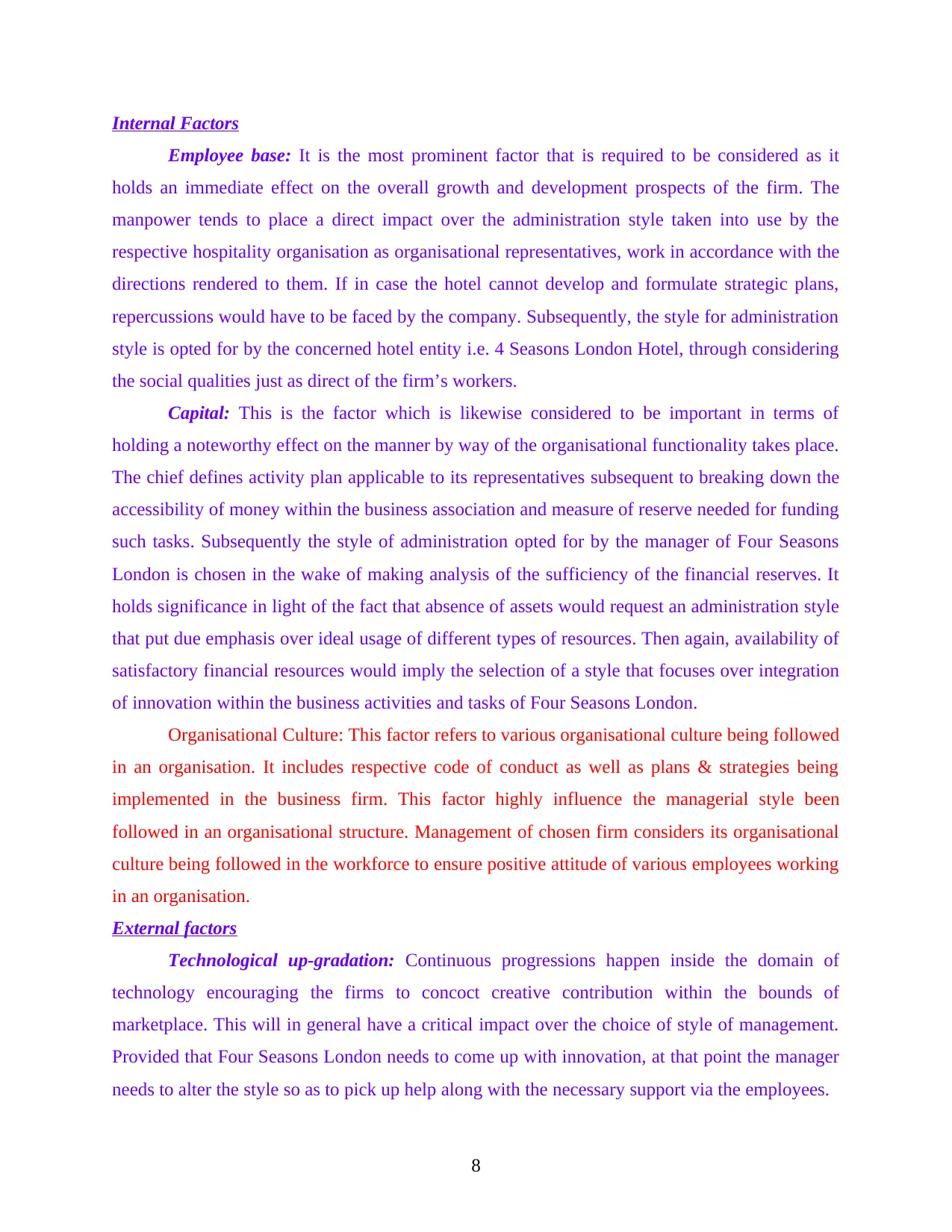
Internal Factors
Employee base: It is the most prominent factor that is required to be considered as it
holds an immediate effect on the overall growth and development prospects of the firm. The
manpower tends to place a direct impact over the administration style taken into use by the
respective hospitality organisation as organisational representatives, work in accordance with the
directions rendered to them. If in case the hotel cannot develop and formulate strategic plans,
repercussions would have to be faced by the company. Subsequently, the style for administration
style is opted for by the concerned hotel entity i.e. 4 Seasons London Hotel, through considering
the social qualities just as direct of the firm’s workers.
Capital: This is the factor which is likewise considered to be important in terms of
holding a noteworthy effect on the manner by way of the organisational functionality takes place.
The chief defines activity plan applicable to its representatives subsequent to breaking down the
accessibility of money within the business association and measure of reserve needed for funding
such tasks. Subsequently the style of administration opted for by the manager of Four Seasons
London is chosen in the wake of making analysis of the sufficiency of the financial reserves. It
holds significance in light of the fact that absence of assets would request an administration style
that put due emphasis over ideal usage of different types of resources. Then again, availability of
satisfactory financial resources would imply the selection of a style that focuses over integration
of innovation within the business activities and tasks of Four Seasons London.
Organisational Culture: This factor refers to various organisational culture being followed
in an organisation. It includes respective code of conduct as well as plans & strategies being
implemented in the business firm. This factor highly influence the managerial style been
followed in an organisational structure. Management of chosen firm considers its organisational
culture being followed in the workforce to ensure positive attitude of various employees working
in an organisation.
External factors
Technological up-gradation: Continuous progressions happen inside the domain of
technology encouraging the firms to concoct creative contribution within the bounds of
marketplace. This will in general have a critical impact over the choice of style of management.
Provided that Four Seasons London needs to come up with innovation, at that point the manager
needs to alter the style so as to pick up help along with the necessary support via the employees.
8
Employee base: It is the most prominent factor that is required to be considered as it
holds an immediate effect on the overall growth and development prospects of the firm. The
manpower tends to place a direct impact over the administration style taken into use by the
respective hospitality organisation as organisational representatives, work in accordance with the
directions rendered to them. If in case the hotel cannot develop and formulate strategic plans,
repercussions would have to be faced by the company. Subsequently, the style for administration
style is opted for by the concerned hotel entity i.e. 4 Seasons London Hotel, through considering
the social qualities just as direct of the firm’s workers.
Capital: This is the factor which is likewise considered to be important in terms of
holding a noteworthy effect on the manner by way of the organisational functionality takes place.
The chief defines activity plan applicable to its representatives subsequent to breaking down the
accessibility of money within the business association and measure of reserve needed for funding
such tasks. Subsequently the style of administration opted for by the manager of Four Seasons
London is chosen in the wake of making analysis of the sufficiency of the financial reserves. It
holds significance in light of the fact that absence of assets would request an administration style
that put due emphasis over ideal usage of different types of resources. Then again, availability of
satisfactory financial resources would imply the selection of a style that focuses over integration
of innovation within the business activities and tasks of Four Seasons London.
Organisational Culture: This factor refers to various organisational culture being followed
in an organisation. It includes respective code of conduct as well as plans & strategies being
implemented in the business firm. This factor highly influence the managerial style been
followed in an organisational structure. Management of chosen firm considers its organisational
culture being followed in the workforce to ensure positive attitude of various employees working
in an organisation.
External factors
Technological up-gradation: Continuous progressions happen inside the domain of
technology encouraging the firms to concoct creative contribution within the bounds of
marketplace. This will in general have a critical impact over the choice of style of management.
Provided that Four Seasons London needs to come up with innovation, at that point the manager
needs to alter the style so as to pick up help along with the necessary support via the employees.
8
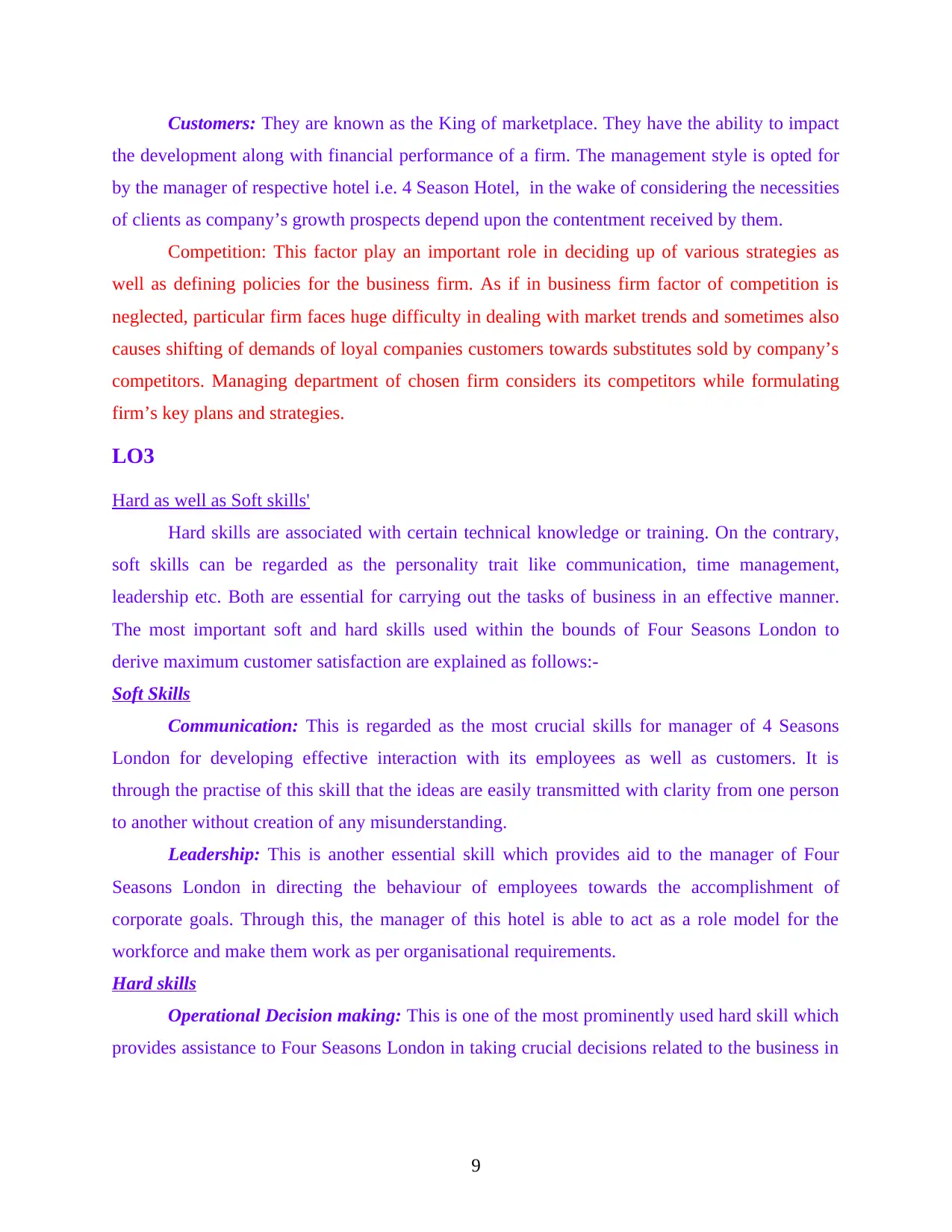
Customers: They are known as the King of marketplace. They have the ability to impact
the development along with financial performance of a firm. The management style is opted for
by the manager of respective hotel i.e. 4 Season Hotel, in the wake of considering the necessities
of clients as company’s growth prospects depend upon the contentment received by them.
Competition: This factor play an important role in deciding up of various strategies as
well as defining policies for the business firm. As if in business firm factor of competition is
neglected, particular firm faces huge difficulty in dealing with market trends and sometimes also
causes shifting of demands of loyal companies customers towards substitutes sold by company’s
competitors. Managing department of chosen firm considers its competitors while formulating
firm’s key plans and strategies.
LO3
Hard as well as Soft skills'
Hard skills are associated with certain technical knowledge or training. On the contrary,
soft skills can be regarded as the personality trait like communication, time management,
leadership etc. Both are essential for carrying out the tasks of business in an effective manner.
The most important soft and hard skills used within the bounds of Four Seasons London to
derive maximum customer satisfaction are explained as follows:-
Soft Skills
Communication: This is regarded as the most crucial skills for manager of 4 Seasons
London for developing effective interaction with its employees as well as customers. It is
through the practise of this skill that the ideas are easily transmitted with clarity from one person
to another without creation of any misunderstanding.
Leadership: This is another essential skill which provides aid to the manager of Four
Seasons London in directing the behaviour of employees towards the accomplishment of
corporate goals. Through this, the manager of this hotel is able to act as a role model for the
workforce and make them work as per organisational requirements.
Hard skills
Operational Decision making: This is one of the most prominently used hard skill which
provides assistance to Four Seasons London in taking crucial decisions related to the business in
9
the development along with financial performance of a firm. The management style is opted for
by the manager of respective hotel i.e. 4 Season Hotel, in the wake of considering the necessities
of clients as company’s growth prospects depend upon the contentment received by them.
Competition: This factor play an important role in deciding up of various strategies as
well as defining policies for the business firm. As if in business firm factor of competition is
neglected, particular firm faces huge difficulty in dealing with market trends and sometimes also
causes shifting of demands of loyal companies customers towards substitutes sold by company’s
competitors. Managing department of chosen firm considers its competitors while formulating
firm’s key plans and strategies.
LO3
Hard as well as Soft skills'
Hard skills are associated with certain technical knowledge or training. On the contrary,
soft skills can be regarded as the personality trait like communication, time management,
leadership etc. Both are essential for carrying out the tasks of business in an effective manner.
The most important soft and hard skills used within the bounds of Four Seasons London to
derive maximum customer satisfaction are explained as follows:-
Soft Skills
Communication: This is regarded as the most crucial skills for manager of 4 Seasons
London for developing effective interaction with its employees as well as customers. It is
through the practise of this skill that the ideas are easily transmitted with clarity from one person
to another without creation of any misunderstanding.
Leadership: This is another essential skill which provides aid to the manager of Four
Seasons London in directing the behaviour of employees towards the accomplishment of
corporate goals. Through this, the manager of this hotel is able to act as a role model for the
workforce and make them work as per organisational requirements.
Hard skills
Operational Decision making: This is one of the most prominently used hard skill which
provides assistance to Four Seasons London in taking crucial decisions related to the business in
9
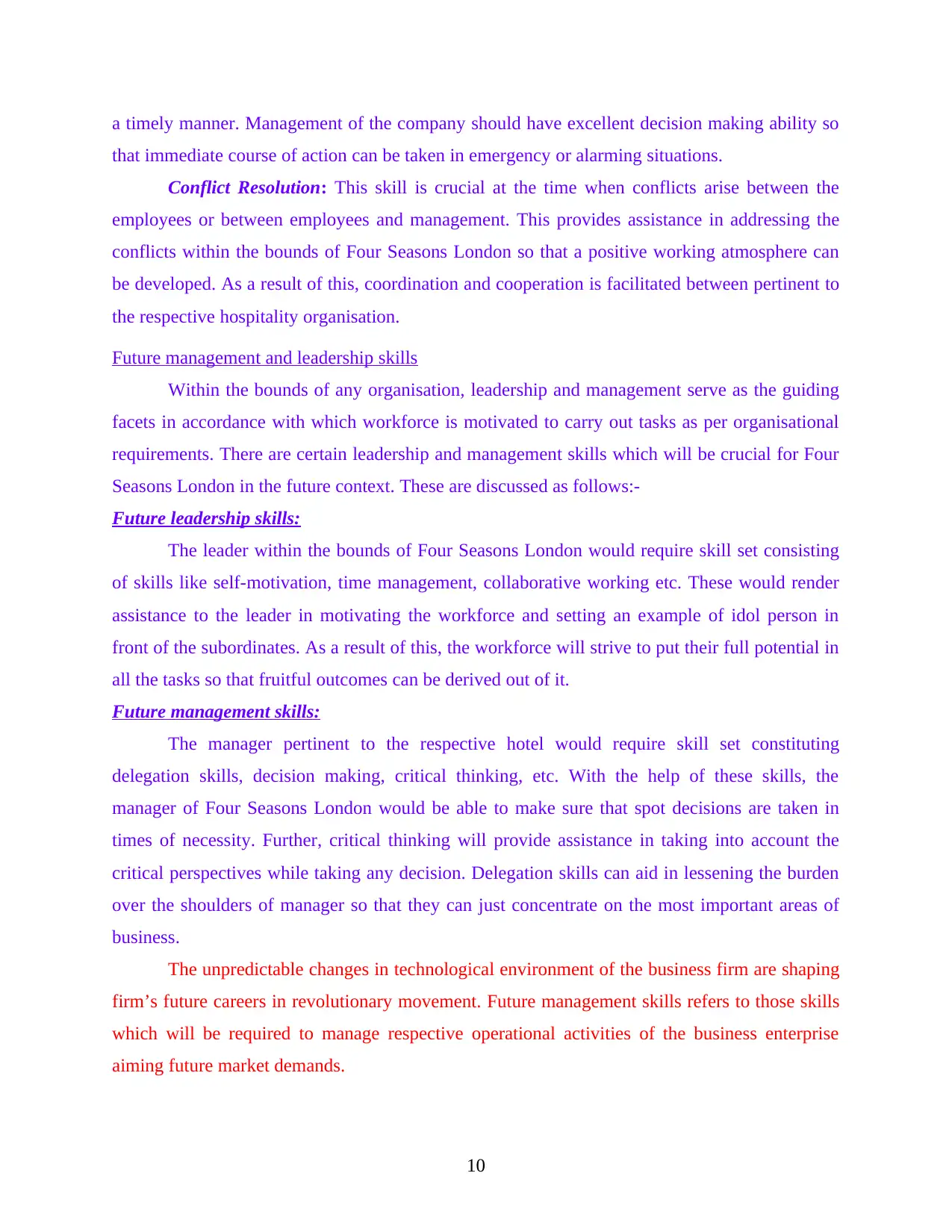
a timely manner. Management of the company should have excellent decision making ability so
that immediate course of action can be taken in emergency or alarming situations.
Conflict Resolution: This skill is crucial at the time when conflicts arise between the
employees or between employees and management. This provides assistance in addressing the
conflicts within the bounds of Four Seasons London so that a positive working atmosphere can
be developed. As a result of this, coordination and cooperation is facilitated between pertinent to
the respective hospitality organisation.
Future management and leadership skills
Within the bounds of any organisation, leadership and management serve as the guiding
facets in accordance with which workforce is motivated to carry out tasks as per organisational
requirements. There are certain leadership and management skills which will be crucial for Four
Seasons London in the future context. These are discussed as follows:-
Future leadership skills:
The leader within the bounds of Four Seasons London would require skill set consisting
of skills like self-motivation, time management, collaborative working etc. These would render
assistance to the leader in motivating the workforce and setting an example of idol person in
front of the subordinates. As a result of this, the workforce will strive to put their full potential in
all the tasks so that fruitful outcomes can be derived out of it.
Future management skills:
The manager pertinent to the respective hotel would require skill set constituting
delegation skills, decision making, critical thinking, etc. With the help of these skills, the
manager of Four Seasons London would be able to make sure that spot decisions are taken in
times of necessity. Further, critical thinking will provide assistance in taking into account the
critical perspectives while taking any decision. Delegation skills can aid in lessening the burden
over the shoulders of manager so that they can just concentrate on the most important areas of
business.
The unpredictable changes in technological environment of the business firm are shaping
firm’s future careers in revolutionary movement. Future management skills refers to those skills
which will be required to manage respective operational activities of the business enterprise
aiming future market demands.
10
that immediate course of action can be taken in emergency or alarming situations.
Conflict Resolution: This skill is crucial at the time when conflicts arise between the
employees or between employees and management. This provides assistance in addressing the
conflicts within the bounds of Four Seasons London so that a positive working atmosphere can
be developed. As a result of this, coordination and cooperation is facilitated between pertinent to
the respective hospitality organisation.
Future management and leadership skills
Within the bounds of any organisation, leadership and management serve as the guiding
facets in accordance with which workforce is motivated to carry out tasks as per organisational
requirements. There are certain leadership and management skills which will be crucial for Four
Seasons London in the future context. These are discussed as follows:-
Future leadership skills:
The leader within the bounds of Four Seasons London would require skill set consisting
of skills like self-motivation, time management, collaborative working etc. These would render
assistance to the leader in motivating the workforce and setting an example of idol person in
front of the subordinates. As a result of this, the workforce will strive to put their full potential in
all the tasks so that fruitful outcomes can be derived out of it.
Future management skills:
The manager pertinent to the respective hotel would require skill set constituting
delegation skills, decision making, critical thinking, etc. With the help of these skills, the
manager of Four Seasons London would be able to make sure that spot decisions are taken in
times of necessity. Further, critical thinking will provide assistance in taking into account the
critical perspectives while taking any decision. Delegation skills can aid in lessening the burden
over the shoulders of manager so that they can just concentrate on the most important areas of
business.
The unpredictable changes in technological environment of the business firm are shaping
firm’s future careers in revolutionary movement. Future management skills refers to those skills
which will be required to manage respective operational activities of the business enterprise
aiming future market demands.
10
Secure Best Marks with AI Grader
Need help grading? Try our AI Grader for instant feedback on your assignments.
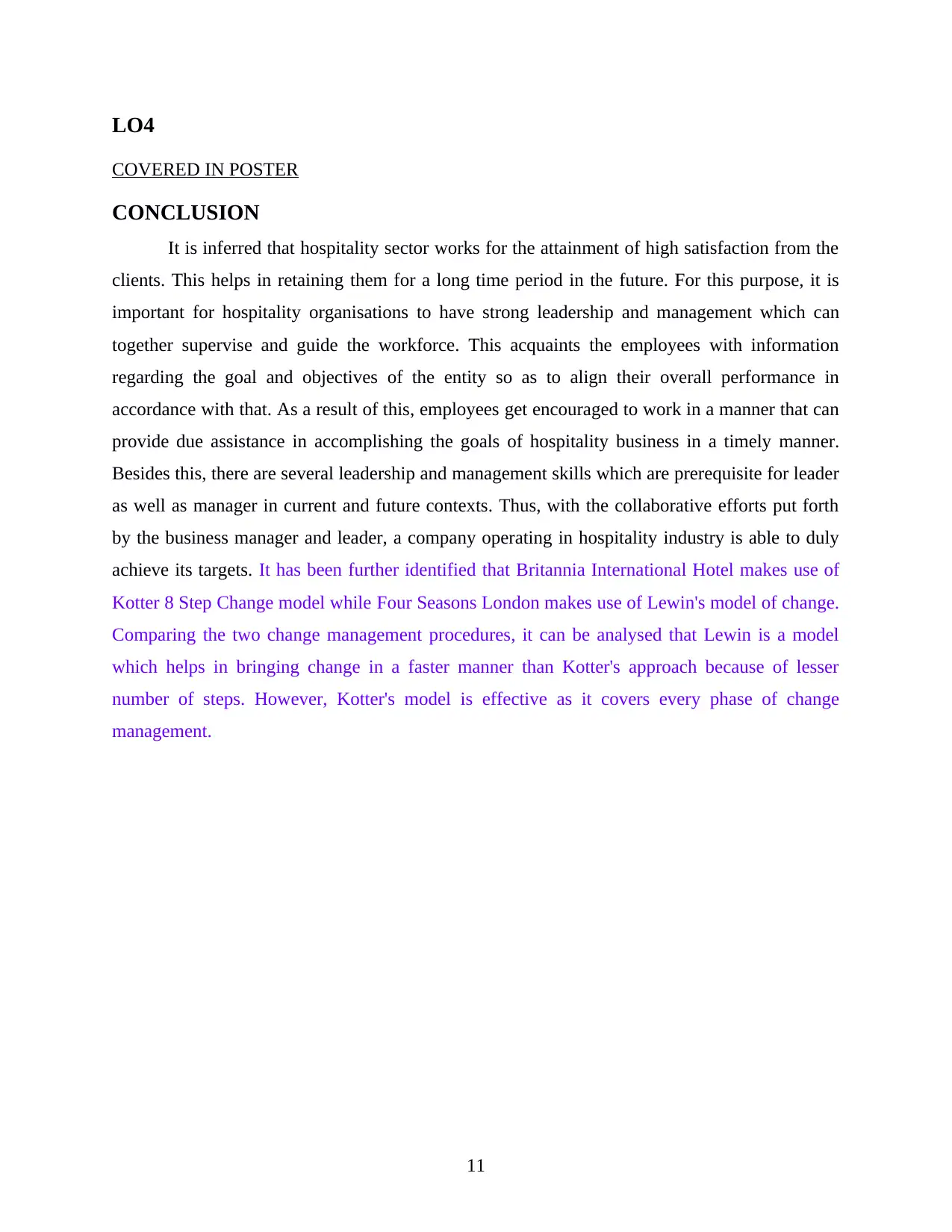
LO4
COVERED IN POSTER
CONCLUSION
It is inferred that hospitality sector works for the attainment of high satisfaction from the
clients. This helps in retaining them for a long time period in the future. For this purpose, it is
important for hospitality organisations to have strong leadership and management which can
together supervise and guide the workforce. This acquaints the employees with information
regarding the goal and objectives of the entity so as to align their overall performance in
accordance with that. As a result of this, employees get encouraged to work in a manner that can
provide due assistance in accomplishing the goals of hospitality business in a timely manner.
Besides this, there are several leadership and management skills which are prerequisite for leader
as well as manager in current and future contexts. Thus, with the collaborative efforts put forth
by the business manager and leader, a company operating in hospitality industry is able to duly
achieve its targets. It has been further identified that Britannia International Hotel makes use of
Kotter 8 Step Change model while Four Seasons London makes use of Lewin's model of change.
Comparing the two change management procedures, it can be analysed that Lewin is a model
which helps in bringing change in a faster manner than Kotter's approach because of lesser
number of steps. However, Kotter's model is effective as it covers every phase of change
management.
11
COVERED IN POSTER
CONCLUSION
It is inferred that hospitality sector works for the attainment of high satisfaction from the
clients. This helps in retaining them for a long time period in the future. For this purpose, it is
important for hospitality organisations to have strong leadership and management which can
together supervise and guide the workforce. This acquaints the employees with information
regarding the goal and objectives of the entity so as to align their overall performance in
accordance with that. As a result of this, employees get encouraged to work in a manner that can
provide due assistance in accomplishing the goals of hospitality business in a timely manner.
Besides this, there are several leadership and management skills which are prerequisite for leader
as well as manager in current and future contexts. Thus, with the collaborative efforts put forth
by the business manager and leader, a company operating in hospitality industry is able to duly
achieve its targets. It has been further identified that Britannia International Hotel makes use of
Kotter 8 Step Change model while Four Seasons London makes use of Lewin's model of change.
Comparing the two change management procedures, it can be analysed that Lewin is a model
which helps in bringing change in a faster manner than Kotter's approach because of lesser
number of steps. However, Kotter's model is effective as it covers every phase of change
management.
11
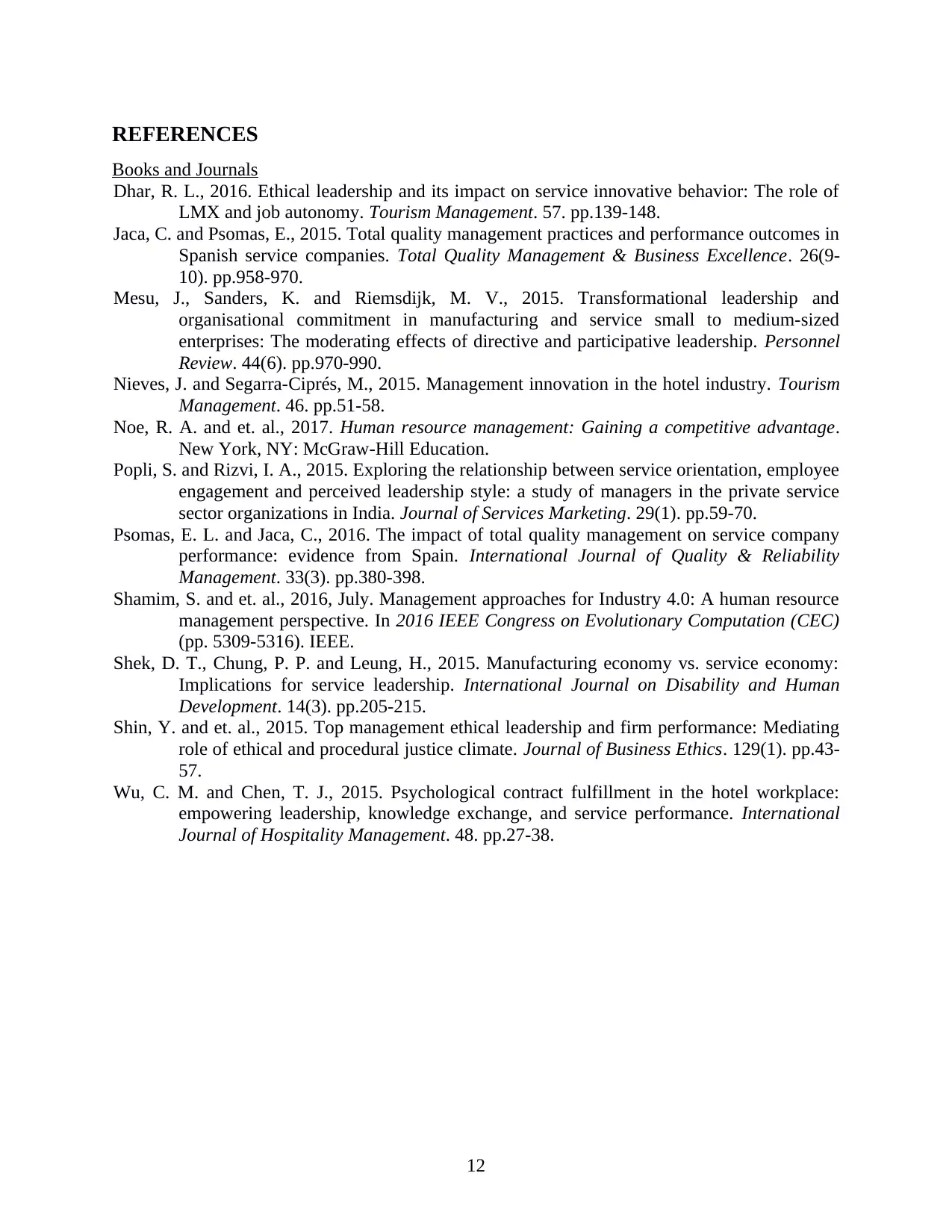
REFERENCES
Books and Journals
Dhar, R. L., 2016. Ethical leadership and its impact on service innovative behavior: The role of
LMX and job autonomy. Tourism Management. 57. pp.139-148.
Jaca, C. and Psomas, E., 2015. Total quality management practices and performance outcomes in
Spanish service companies. Total Quality Management & Business Excellence. 26(9-
10). pp.958-970.
Mesu, J., Sanders, K. and Riemsdijk, M. V., 2015. Transformational leadership and
organisational commitment in manufacturing and service small to medium-sized
enterprises: The moderating effects of directive and participative leadership. Personnel
Review. 44(6). pp.970-990.
Nieves, J. and Segarra-Ciprés, M., 2015. Management innovation in the hotel industry. Tourism
Management. 46. pp.51-58.
Noe, R. A. and et. al., 2017. Human resource management: Gaining a competitive advantage.
New York, NY: McGraw-Hill Education.
Popli, S. and Rizvi, I. A., 2015. Exploring the relationship between service orientation, employee
engagement and perceived leadership style: a study of managers in the private service
sector organizations in India. Journal of Services Marketing. 29(1). pp.59-70.
Psomas, E. L. and Jaca, C., 2016. The impact of total quality management on service company
performance: evidence from Spain. International Journal of Quality & Reliability
Management. 33(3). pp.380-398.
Shamim, S. and et. al., 2016, July. Management approaches for Industry 4.0: A human resource
management perspective. In 2016 IEEE Congress on Evolutionary Computation (CEC)
(pp. 5309-5316). IEEE.
Shek, D. T., Chung, P. P. and Leung, H., 2015. Manufacturing economy vs. service economy:
Implications for service leadership. International Journal on Disability and Human
Development. 14(3). pp.205-215.
Shin, Y. and et. al., 2015. Top management ethical leadership and firm performance: Mediating
role of ethical and procedural justice climate. Journal of Business Ethics. 129(1). pp.43-
57.
Wu, C. M. and Chen, T. J., 2015. Psychological contract fulfillment in the hotel workplace:
empowering leadership, knowledge exchange, and service performance. International
Journal of Hospitality Management. 48. pp.27-38.
12
Books and Journals
Dhar, R. L., 2016. Ethical leadership and its impact on service innovative behavior: The role of
LMX and job autonomy. Tourism Management. 57. pp.139-148.
Jaca, C. and Psomas, E., 2015. Total quality management practices and performance outcomes in
Spanish service companies. Total Quality Management & Business Excellence. 26(9-
10). pp.958-970.
Mesu, J., Sanders, K. and Riemsdijk, M. V., 2015. Transformational leadership and
organisational commitment in manufacturing and service small to medium-sized
enterprises: The moderating effects of directive and participative leadership. Personnel
Review. 44(6). pp.970-990.
Nieves, J. and Segarra-Ciprés, M., 2015. Management innovation in the hotel industry. Tourism
Management. 46. pp.51-58.
Noe, R. A. and et. al., 2017. Human resource management: Gaining a competitive advantage.
New York, NY: McGraw-Hill Education.
Popli, S. and Rizvi, I. A., 2015. Exploring the relationship between service orientation, employee
engagement and perceived leadership style: a study of managers in the private service
sector organizations in India. Journal of Services Marketing. 29(1). pp.59-70.
Psomas, E. L. and Jaca, C., 2016. The impact of total quality management on service company
performance: evidence from Spain. International Journal of Quality & Reliability
Management. 33(3). pp.380-398.
Shamim, S. and et. al., 2016, July. Management approaches for Industry 4.0: A human resource
management perspective. In 2016 IEEE Congress on Evolutionary Computation (CEC)
(pp. 5309-5316). IEEE.
Shek, D. T., Chung, P. P. and Leung, H., 2015. Manufacturing economy vs. service economy:
Implications for service leadership. International Journal on Disability and Human
Development. 14(3). pp.205-215.
Shin, Y. and et. al., 2015. Top management ethical leadership and firm performance: Mediating
role of ethical and procedural justice climate. Journal of Business Ethics. 129(1). pp.43-
57.
Wu, C. M. and Chen, T. J., 2015. Psychological contract fulfillment in the hotel workplace:
empowering leadership, knowledge exchange, and service performance. International
Journal of Hospitality Management. 48. pp.27-38.
12
1 out of 12
Related Documents
Your All-in-One AI-Powered Toolkit for Academic Success.
+13062052269
info@desklib.com
Available 24*7 on WhatsApp / Email
![[object Object]](/_next/static/media/star-bottom.7253800d.svg)
Unlock your academic potential
© 2024 | Zucol Services PVT LTD | All rights reserved.





